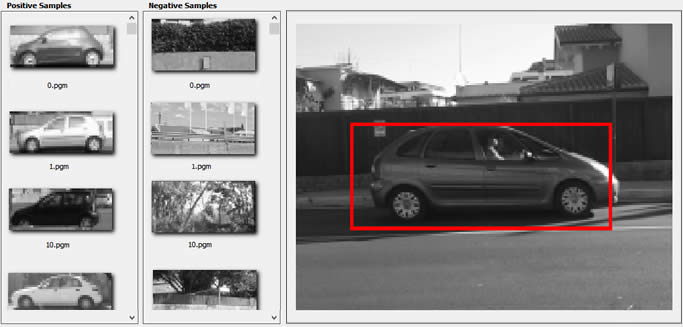TIEVisionCascadeClassifierTrainer.trainCascade
Declaration
procedure trainCascade(cascadeDirName: PAnsiChar; vecName: PAnsiChar; bgImagesDir: PAnsiChar; numPos: int32_t = 1000; sampleWidth: int32_t = 24; sampleHeight: int32_t = 24; numStages: int32_t = 20; featureType: TIEVisionFeatureType = ievHAAR; continueTraining: bool32 = false; msgCallBack: TIEVisionTrainCascadeMsgCallBack = nil; precalcValBufSize: int32_t = 256; precalcIdxBufSize: int32_t = 256; baseFormatSave: bool32 = false; acceptanceRatioBreakValue: double = -1.0; boostType: TIEVisionHaarBoostType = ievGENTLE_ADABOOST; minHitRate: double = 0.995; maxFalseAlarmRate: double = 0.45; weightTrimRate: double = 0.95; maxDepth: int32_t = 1; maxWeakCount: int32_t = 120; haarFeatureSet: TIEVisionHaarMode = ievBASIC); safecall;Description
Trains a cascade classifier given a positive samples file and a set of background (negative) images.You can use classifier files to find content within images.

| Parameter | Description |
|---|---|
| cascadeDirName | Path to a directory containing training temporary files and final result file 'cascade.xml' |
| vecName | Input positive samples file |
| bgImagesDir | Path to a directory containing background (negative) samples |
| numPos | Number of positive samples. This should be up to 85% of positives contained in "vecName" file |
| sampleWidth | Positive sample width (should have the same value of samples contained in "vecName") |
| sampleHeight | Positive sample height (should have the same value of samples contained in "vecName") |
| numStages | Number of cascade stages to be trained. If you set the same value of already trained stages (existing in cascadeDirName directory) and continueTraining is True then only the final "cascade.xml" file is generated |
| featureType | Type of features: ievHAAR for Haar-like features, ievLBP for local binary patterns |
| continueTraining | If False the content of cascadeDirName is removed, otherwise training continues using the already trained stages |
| msgCallBack | Specifies a function to monitor training. This callback can be used also to stop a training, among stages |
| precalcValBufSize | Size of buffer for precalculated feature values (in MB) |
| precalcIdxBufSize | Size of buffer for precalculated feature indices (in MB) |
| acceptanceRatioBreakValue | This argument is used to determine how precise your model should keep learning and when to stop. By default this value is set to -1 to disable this feature |
| boostType | Type of boosted classifiers: ievDISCRETE_ADABOOST for Discrete AdaBoost, ievREAL_ADABOOST for Real AdaBoost, ievLOGITBOOST for LogitBoost, ievGENTLE_ADABOOST for Gentle AdaBoost (default) |
| minHitRate | Minimal desired hit rate for each stage of the classifier (0.995) |
| maxFalseAlarmRate | Maximal desired false alarm rate for each stage of the classifier (0.45) |
| weightTrimRate | Specifies whether trimming should be used and its weight (0.95) |
| maxDepth | Maximal depth of a weak tree (1) |
| maxWeakCount | Maximal count of weak trees for every cascade stage (120) |
| haarFeatureSet | Selects the type of Haar features set used in training. ievBASIC use only upright features, while ievALL uses the full set of upright and 45 degree rotated feature set |
Demo
 | Demos\IEVision\TrainCascadeClassifier\TrainCascadeClassifier.dpr |
Example
// create training samples file "samples.vec" from real positive samples stored in 'positive_images"imagesCount = cascadeTrainer.createSamplesFromImageSet('positive_images', 'samples.vec', 40, 40);
// trainCascade images count must be less than 85% of the images in "vec" file
imagesCount := trunc(imagesCount * 0.85);
// train the cascade classifier with 10 stages using LBP. The output will be "trainingresult\cascade.xml", the you should use in TIEVisionObjectsFinder to find objects.
cascadeTrainer.trainCascade('trainingresult', 'samples.vec', 'negative_images', imagesCount, 40, 40, 10, ievLBP);